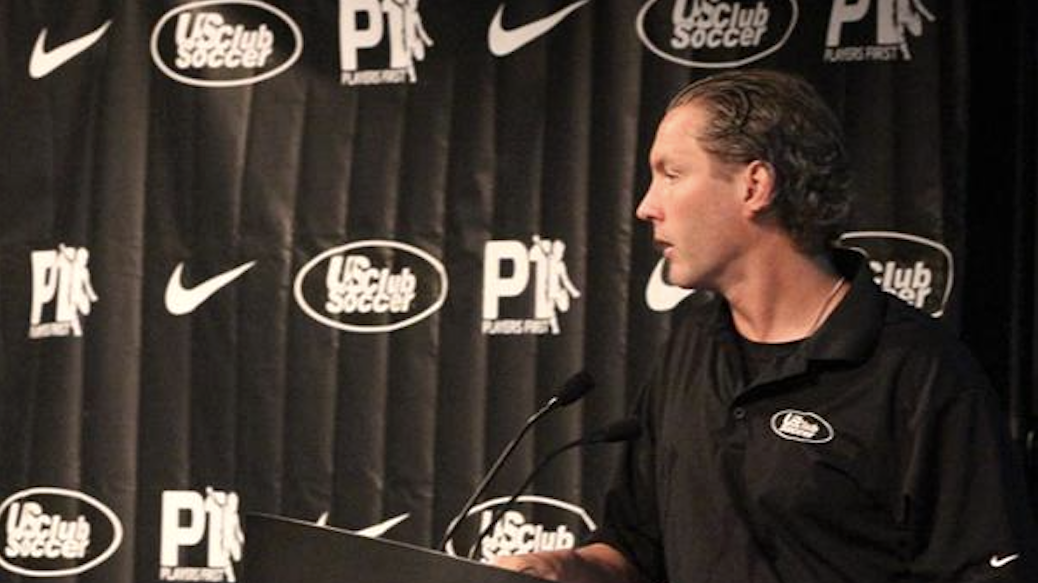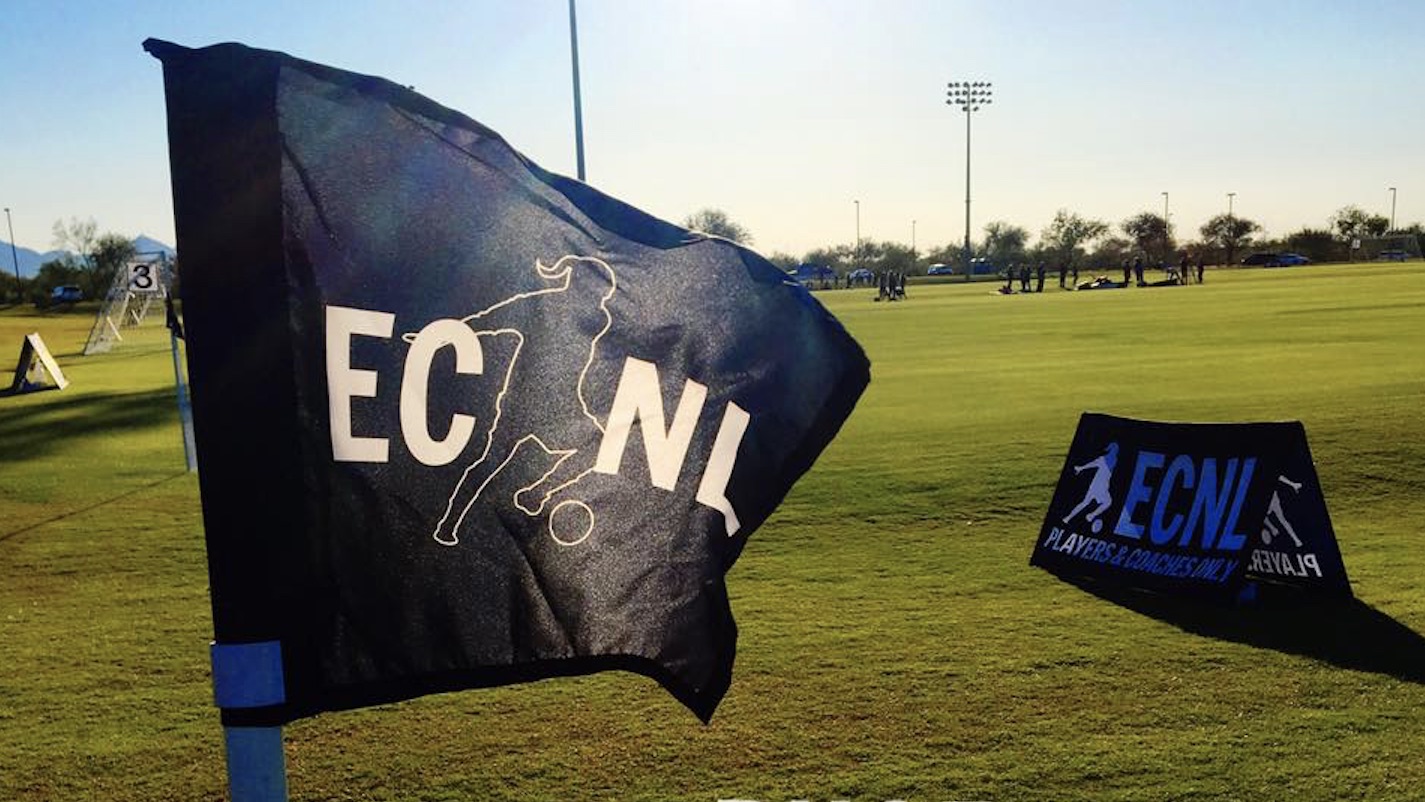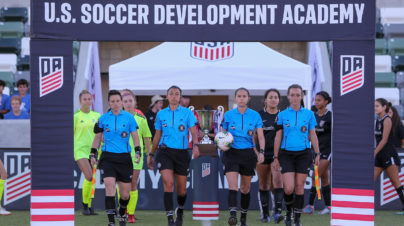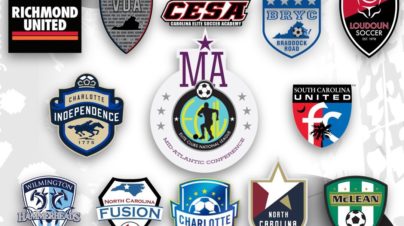SoccerWire Q&A: ECNL prez Christian Lavers on a seismic week in youth soccer

By Charles Boehm
SoccerWire Resident Analyst
If you’re the type of person who has to boil down every situation to winners and losers, it’s hard to spot a bigger winner from this week’s startling death of the U.S. Soccer Development Academy than Christian Lavers.
Ever since U.S. Soccer launched the Girls DA in direct competition with the Elite Clubs National League three years ago, Lavers – as the ECNL’s president and one of its founders – has become a symbol of defiance in the face of the federation’s power, as his sly adoptation of the insignia of Star Wars’ Rebel Alliance as his Twitter avatar suggests.
The league that viewed the Girls DA as an existential threat is now bigger and more in demand than ever, with DA clubs from coast to coast flocking in its direction, seeking spots in both its established girls competition and the boys side founded in 2017.
 Daunting challenges remain for ECNL and its members, with the coronavirus pandemic and the national shutdown it provoked posing serious repercussions for youth soccer and society as a whole. SoccerWire’s Charles Boehm caught up with Lavers to discuss all this and more on Thursday.
Daunting challenges remain for ECNL and its members, with the coronavirus pandemic and the national shutdown it provoked posing serious repercussions for youth soccer and society as a whole. SoccerWire’s Charles Boehm caught up with Lavers to discuss all this and more on Thursday.
SoccerWire: I know there’s a lot of factors that went into the DA’s demise. But looking back, one could argue that the launch of the Girls DA kind of set all this in motion, because it turned out to be an overreach that ultimately backfired on the fed. Have this week’s events proved you and your ECNL colleagues right?
Christian Lavers: Well, we believed in the things we believe in. We believe in the processes and the collaborative nature of our league, and the importance of listening to people in the grassroots and trying to accommodate what they felt was important and worked with the players that they’re working with every single day. And I think one of the things that’s come out of this, and a positive for us, is that our clubs are aligned with the league and the values that we all talk about, a lot more than we were four years ago. Because in these types of situations, there’s always a lot of soul-searching and debating and discussing about what do we do and why do we do it. I think that that process has been good for us, although I would never want to go through that type of conflict again.
SW: I’m guessing that your phone and emails have been off the hook. Can you give me a little window into what the last couple of days have been like for you in terms of the contacts you’ve gotten in the messages and the conversations you’ve had?
CL: I think I’m probably averaging 70 phone calls a day. And then I don’t even know how many text messages and emails. It’s been it’s been 12 hours, 14 hours a day of just talking, discussing, answering questions, trying to figure out what’s next. The uncertainty of coronavirus and everything around that was already causing us to try and plan and think differently. But the [federation’s] announcement, it’s like the floodgates have opened up. And then there was the MLS [youth league] announcement, which caused a different type of floodgate to open up. So a lot of people talking trying to figure out what’s next, what do we do, talking about what’s happened and why.
SW: Even if ECNL expands and the MLS league brings in a lot of non-MLS teams, it still seems some clubs will be left out. That can be stressful for them, but is it possible that there’s a positive to the reshuffling and maybe a winnowing process that happens in the next few months?
CL: I don’t think any club is going to be left with no place to play. And it may not be the place that they want to be, where they feel like they should be, but with all of the different leagues and programs out there, I think everybody will find a place. I do think it’s an opportunity for the elite side of the game, for lack of a better word, to have a little bit more unification than has been there for a long time. But it’s not going to happen overnight. It’s not going to happen even in one playing season, because it’s April 15.
We’re in the middle of this huge crisis that’s going to dramatically change how sport looks in the next six to 12, months, depending on when it starts again, and with all that uncertainty, and then you add the fact that we also have capacity issues in terms of how many clubs can we put in without creating a problem, especially in the short term. So I think there’s going to be clubs that come into our league now, there’s going to be clubs that come in in a year from now. And that’s not going to be because we’re drawing this out in a fabricated manner, it’s going to be because of the timing of all this and the circumstances and just the real logistics of trying to figure this out.
SW: Just how bad do you think the financial picture is for clubs out there? Are we going to lose a significant number of clubs entirely because of the economic elements of this crisis?
CL: I try to be optimistic on this. I think that if we were playing soccer in June or July – even if it was just clubs, being able to hold training sessions and get kids back on the field, and sort of get somewhat back to normal – I think there’s not going to be a huge number of clubs that disappear. It doesn’t mean there’s not belt tightening, it doesn’t mean there’s not a reduction in kids in the game, which I think another thing that might happen in this, for a lot of different reasons. But I think you kind of get through it.
If soccer gets pushed back to August, September, October. I think there’s going to be a lot of youth soccer clubs that cannot survive that. Because if kids can’t play, then there’s no revenue for clubs and then people don’t have jobs, and it’s just going to look like a drastically different landscape. And I pray that we don’t get to that point.
SW: For everybody, even the clubs at the top and the pro clubs, the travel costs of national play are just enormous. And it also seems like the marketplace’s appetite for that may fundamentally change depending on how bad the economic fallout is. Could we be looking at a more regionalized model for elite soccer in the future?
CL: From our perspective, we’ve been actively reducing travel in most areas of the country every year for the past several years, and that’s been deliberate. And that’s because people don’t want to spend nights in hotels over and over to play a couple soccer games. So our perspective has been, when you have to go spend the night in a hotel or you have to get on the plane, it better be for an unbelievable experience, like a massive showcase in front of hundreds of colleges that help prepare you for the next stage in your career. And so we’ve been expanding to kind of fill in density in our conferences to allow a much better travel balance.
The DA collapse, or whatever you want to refer to it as, I think will help in the sense that there will be clubs that drop into leagues that already have local members and that will help provide more local games. And I think that is a good thing. Coronavirus obviously is going to drive the market even further in that regard. At some point you have to travel when you get to a certain level of competition, because you need to find equivalent matches. But it’s a balance. We’re really going to be having these discussions at some level: When is a 2-2 game worth a hotel stay, when a 3-0 does not have one? That’s the balance that everybody’s going to try and figure out. I think it’s going to go very much more towards less travel for a while, and that’s not a bad thing.
SW: Have you heard from anybody at the federation? Do you get a sense that you can maybe turn a page with that relationship?
CL: Over the last several months there’s been a lot more conversation happening. I talked to Cindy [Parlow Cone, USSF’s president] today, briefly, and I think she’s going to do a great job. It’s a really difficult time for her to come into a president role and I think she’s had some really tough decisions to make at a really tough time. But I think she’s going to do a great job. She has a perspective of the game that I think is going to be really, really helpful.
 We’ve had good conversations with Kate Markgraf, with Carlos Bocanegra, we’ve talked about our desire for more education, and to find a way to get more coaches into more accessible education programs. I think that there is a real opportunity here for all the youth organizations to work with each other a little bit more, but certainly work with the federation in a different relationship than there what there has been for the last several years.
We’ve had good conversations with Kate Markgraf, with Carlos Bocanegra, we’ve talked about our desire for more education, and to find a way to get more coaches into more accessible education programs. I think that there is a real opportunity here for all the youth organizations to work with each other a little bit more, but certainly work with the federation in a different relationship than there what there has been for the last several years.
SW: I’ve tried to make sense of what different people are telling me about the events of the past couple days, and I’ve detected that there’s a strong sort of conspiratorial air that some people have, and perhaps with reason with anything regarding the fed. Some perceive that this move is being justified by coronavirus, or the lawsuit with the women’s national team, or that really this is what they wanted to do all along. Can you help me sift through some of the different theories and lines of thinking about how this all went down?
CL: I’m sure there were a lot of different things that the federation has to deal with when considering this. Obviously, the coronavirus issue is a massive, massive issue, especially when you think about all the games that have been canceled that are national-team revenue games. I don’t know the internal factors of the federation.
I’ve said in other interviews, so it’s no secret: I think the best federation role is as an education-providing body, as an organization that is leading its membership and supporting its membership, and I think the federation is positioning to do that really well. I don’t know how and why they came to the conclusions of these decisions, and you can probably ask 10 people and get 10 different answers. But I like to think that the youth game will continue to be in a better and better spot as people work together more, and as the federation helps people in the youth space.

















